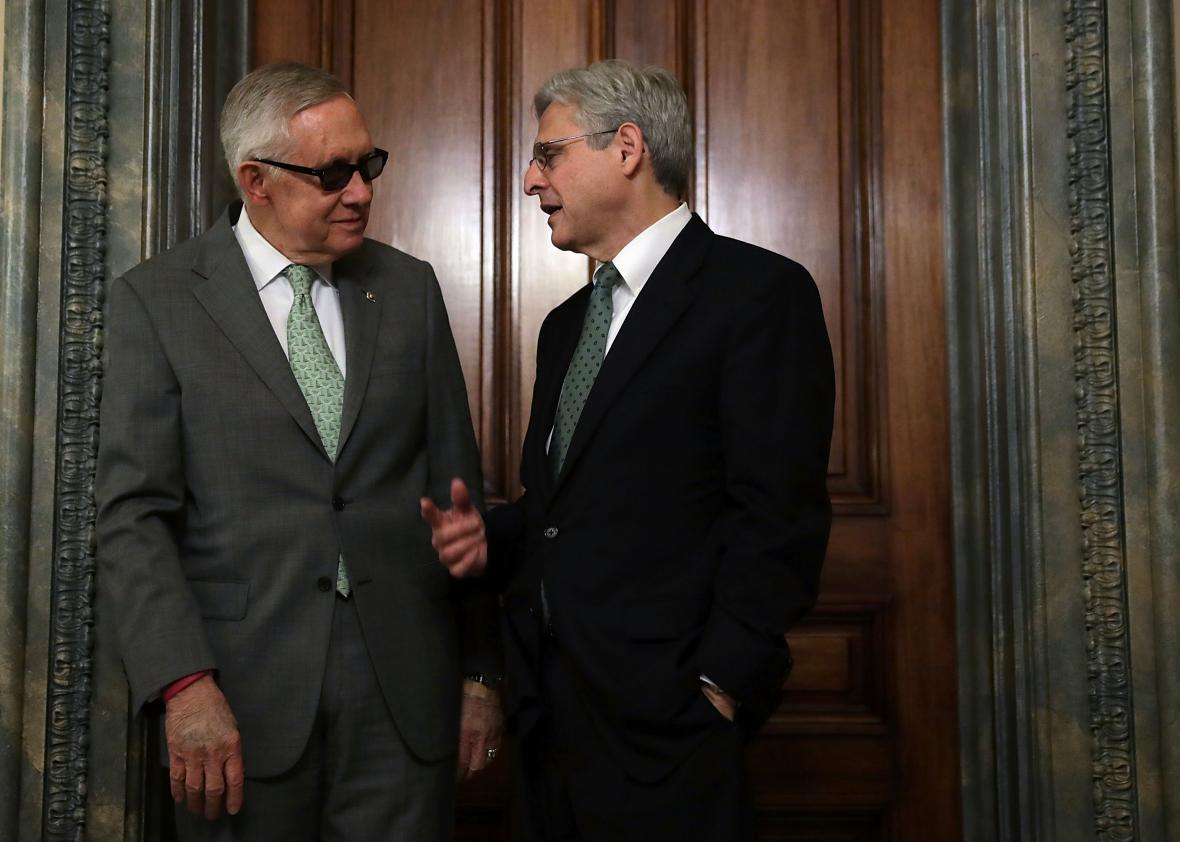One parting thought for Mark, and one for Dahlia and Mike.
First, Mark, cheer up! When I was young like you, I always focused on how things could be so much better. Now that I’m old, I typically take solace in the fact that things could be so much worse. Even if there are potential nominees out there who in your view might be better than Merrick Garland, he’s still really good, and for that we should all cheer.
The next justice will have an impact based on his or her votes, voice, and vision. As for the votes part: For the near future, Eric Posner is largely right—regardless of whether the next justice is a crusader or moderate, the court’s swing voter will shift from Justice Anthony Kennedy to Justice Stephen Breyer and no further. You love crusaders, Mark, but a moderate may actually be more likely from time to time to convince persuadable Republican appointees to rule with the liberal block. That’s where voice comes in, and where Eric’s powerful but, I think, crude political model may oversimplify things. Remember, John Roberts is still chief justice and remember that he was the key to upholding Obamacare. Remember, also, that Kennedy was the key to same-sex marriage. Now ask yourself whether Garland or some generic crusading liberal ideologue would be more likely to persuade Roberts or Kennedy on an intimate court in which the justices do not merely vote but make legal arguments both orally and in print. (By the way, Roberts and Garland, after similar stints at Harvard, both clerked for the same circuit judge, Henry J. Friendly, who emphatically believed that proper judging was quite different from pure partisanship or ideological politics. True, the Supreme Court is by its nature more political—but even here, I’m with Friendly, Garland, and Roberts in believing in a law-politics distinction.)
As for the final component—vision—if transformative vision is what you seek, Mark, you are not likely to find it on the lower court bench. Judging ordinary legal issues day in and day out leaves little time to think deeply about the system as a whole. The mice in the maze cannot easily levitate themselves to see the entire grid from above. So if you want such transformative vision, à la Justice Hugo Black, you might be better off trolling the academy or the Senate for the likes of a Larry Lessig, or a Randy Kennedy, or an Elizabeth Warren. Perhaps President Hillary Clinton could one day appoint Justice Barack Obama if the election goes as currently expected and that’s the type of vision she wants on the court.
OK, this brings me to Mike and Dahlia: Given that we are now all on Team Garland, what is his best path forward to get confirmed? My proposed compromise is to take the Republican senators at their word and construe their position with maximal charity. What is at stake, Republicans correctly remind us, is the swing seat on the court. True, the Democrats won the presidency in 2012, but Republicans won the Senate in 2014. In the view of Senate Republicans, it’s now a tie—and the tiebreaker should go to the political party that wins this November. The court’s future should be informed by the people themselves in the upcoming election, this line of thinking goes. Obama’s legacy is on the ballot, de facto; the court is on the ballot, de facto; and swing senators are on the ballot, de jure. Let the people decide!
To which I say: OK, but if we want the people to decide, and decide intelligently—if popular elections of presidents and senators and the Constitution’s openly political process of filling court vacancies are features of the system and not bugs—then let’s enable the people to decide intelligently. Let’s do our best to structure the 2016 election so that the people can better understand the court at its current crossroads. Let’s devise a system so that the people can assess the current court, Merrick Garland, and the various claims of his supporters and his detractors. This requires that we don’t compromise with Republican Senators promising unprecedented obstruction. Basically: Let’s have hearings! Sometime soon—before the election! And let’s encourage the American electorate to listen in and decide for themselves who are, to borrow Dahlia’s great phrase, the “grown-ups” in the room. The Senate as a whole need not take a final vote on Garland’s nomination until after the election, and by then the people will have spoken with their eyes and ears open. If Donald Trump or some other Republican wins, then Garland goes down. But if Hillary wins—and wins in part based on her strong support of Garland—then the Senate could confirm Garland, pronto, in early November. He could then quickly join the court and ensure that its next term will operate relatively smoothly, with a full complement of nine justices.
Oh, and by the way … even if Clinton loses, if the Democrats somehow manage to retake the Senate, they would be free to confirm Garland when the new Senate convenes in early January after reforming the filibuster with one simple vote—the nuclear option. In fact, a Democrat-controlled Senate would even be free to confirm two more Obama nominees in the window between the start of the Congressional session on Jan. 3 and the presidential inauguration on Jan. 20 were, say, Ruth Bader Ginsburg and Breyer to offer to step down as a rebuke to obstructionist Republicans. Just saying.
It won’t happen, of course, but, Mark, I hope the mere thought of this gives you an additional reason to smile.
Read more on Obama’s nomination of Merrick Garland to the Supreme Court.
